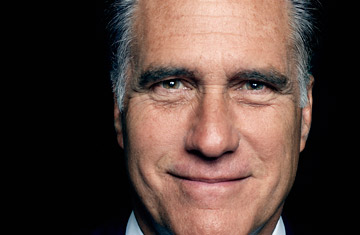
(3 of 11)
As he launches his fall campaign at the Republican Convention in Tampa, Romney is making the sales pitch of his life. Once he asked investors to entrust him with their money; now he is taking the stage to ask Americans for the keys to the nuclear arsenal and a $15 trillion economy. For a variety of reasons, Romney is running on his rsum, arguing that he has the private-sector skills to set the economy right. It is an unusual strategy for a challenger, the more so because he scorns what history suggests is his best credential. No businessman has been elected President without holding high office first, and more governors have won the White House than Senators or even Vice Presidents. But Republican doctrine discourages talk of Romney's term as Massachusetts' governor, which featured state-mandated health care, gun control, abortion rights and other heresies.
Instead he has placed his business record front and center, a strategy tried without success by other titans of industry, from Henry Ford and William Randolph Hearst to Ross Perot. One of his regular campaign lines, delivered again last month in Canton, Ohio, is "I'm a business guy. I was only governor four years. I didn't inhale." At another stop, it became an incantation, with "I didn't inhale" reprised in seven of eight consecutive sentences.
That sounds at first like a slap at Bill Clinton, who coined the phrase while dodging questions about his marijuana-smoking days at Oxford. But Romney's real target is government itself and the alleged virtue, in a would-be President, of prior service there. He is touting his private-sector career not as a close substitute for time in the Oval Office but as the superior credential. "I spent 25 years balancing budgets, eliminating waste and keeping as far away from government as humanly possible," he told the Conservative Political Action Conference (CPAC) in February. In Las Vegas three months later, he applauded a proposal he attributed to a restaurant owner he had just met: "He said, 'I'd like to have a provision in the Constitution ... that the President has to spend at least three years working in business before he could become President of the United States.'"
By just about any business standard--above all, profit and loss--Romney was a spectacular performer. He joined the consulting firm Bain & Co. in 1977, rose swiftly to the top and later returned as the consensus choice to save it from bankruptcy. In 1984 he founded Bain Capital, a spin-off private-equity firm, and turned $37 million in seed money into billions of dollars of assets under management. "From 1984 to 1999, his funds returned 88% per year, which is a record of truly enviable proportions," said Howard Anderson, a former venture capitalist and investor in Bain and now a senior lecturer at MIT's Sloan School of Management, who has known Romney since the 1980s. Along the way, Romney amassed a personal fortune in the neighborhood of $200 million. Estimates vary, and he has not chosen to settle the question.
